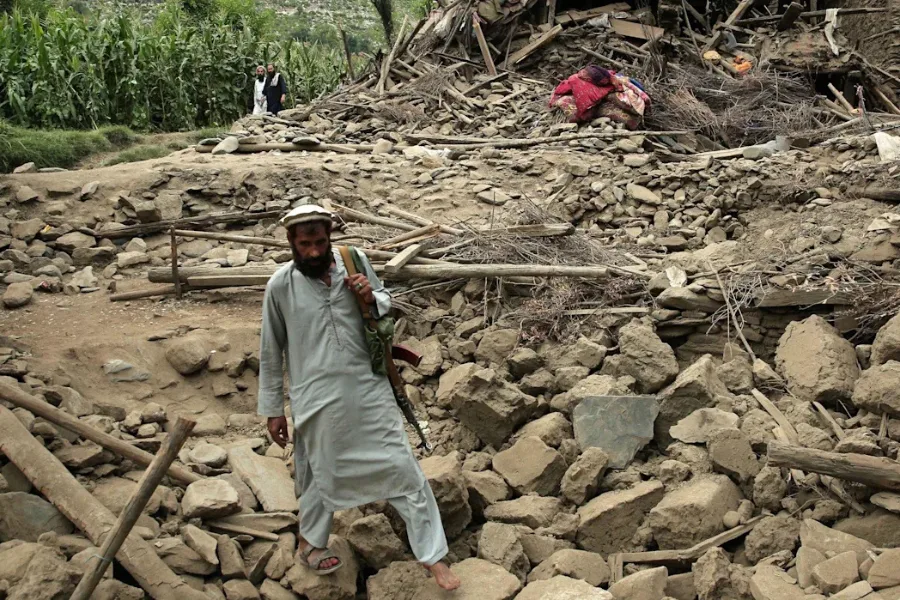
Afghanistan Earthquake 2025: An intense 6.0-magnitude quake struck eastern Afghanistan late Sunday evening. It created havoc to an already unstable state. Towns and villages lay in ruins and people who still had a roof to sleep under were sleeping outside under the stars. While searches for survivors were ongoing. Currently, the latest tremor has caused more than 800 deaths and over 2700 injured and is one of today’s headline stories. This has been reported around the globe and requested for immediate help.
Focus and Impact
The United States Geological Survey (USGS), reported the epicenter was located about 27 kilometers from Jalalabad. It was relatively shallow, at eight kilometers below the surface of the earth. Its shallow quality added to the impact of the earthquake; Kunar province – the province bordering Pakistan was the hardest hit.
In Kunar, it is reported by Taliban government spokesperson Zabihullah Mujahid, that roughly 800 were killed and 2500 injured. While the adjoining province of Nangarhar, reported 12 dead, and 255 injured, and Laghman province had acknowledged, just 58 injured. Officials warn that fatalities could rise as many victims are still buried under the rubble.
Drowned Survivors Left Alone and on their Own
Witnesses have described horrifying images of houses made of mud and stone crumbling into the steep ravines. “Many people are trapped under their ceilings,” Ehsanullah Ehsan, the director of disaster management for Kunar Province explained.
Many impacted villages are still isolated from the primary road which will set back government and humanitarian workers’ ability to provide assistance.
Survivors, most of whom lost their homes, were forced to remain in frigid conditions overnight without any form of shelter, after the quake’s five aftershocks heightened fear and delayed rescue capacity.
Global Response and United Nations Assistance
Antonio Guterres, Secretary-General of the United Nations, raised grave concerns and confirmed that the United Nations is in extensive engagement with Afghan authorities to identify need and provide assistance. He announced that an initial $5 million will be made available through the UN’s emergency response fund. It is to assist with immediate response through a joint initiative.
The International Organisation for Migration (IOM) indicated that some of the worst affected areas in Kunar is still inaccessible. Meanwhile, world leaders such as Pope Leo XIV offered condolences. The Vatican reported that the Pope was “deeply troubled by the death toll.”
An Already Impaired Country
The significance of the earthquake becomes all the more tragic when considering the fragile condition of Afghanistan. Afghanistan is among the poorest countries in existence. It has been in a state of war, political instability and humanitarian crises for decades.
Since the Taliban took control of the country in 2021, levels of foreign support have decreased dramatically. The available resources that Afghanistan does have to deal with major catastrophes have been reduced to a tenuous level.
With additional millions of Afghans returning from Pakistan and Iran in recent years. There had already been tremendous stress on an already stressed out and fractured infrastructure. The United Nations recently noted that it would have to reduce plans for global humanitarian assistance due to “the most serious funding cuts in history.”
Reductions in US Support and Funding Shortfall
Afghanistan received the most assistance from the United States until 2025. Almost all assistance languished following the policy shifts from the Donald Trump era. The abrupt cessation of aid has significantly weakened Afghanistan’s capacity to respond to crises of earthquakes, floods, and food shortages.
In summation, the effects of this latest disaster and the lack of resources are already evident. Relief efforts are underway with challenges ahead, and experts are suggesting recovery efforts will require global support.
Global Cooperation Needed
The earthquake that hit Afghanistan serves as a brutal reminder of how natural disasters can also showcase the challenges of countries with poverty or turmoil in the existing government structure. Rescue efforts are beginning; however success is still limited by blockages of roads, damaged infrastructure, and basic medical care.
As the unfolding events continue, international humanitarian agencies are asking the world to respond to needs, and provide more support for those countries. This is true because if assistance is not provided, further deaths and suffering will result.
The earthquake that hit Afghanistan that resulted in over 800 deaths has been one of the most tragic stories taking up trending news today. Beyond the profound loss of lives, the earthquake has highlighted the fragilities of Afghanistan and the underlying need for international support to help move forward. The UN is in process of engagement and the international community is closely monitoring this tragedy, which will continue to unfold over the next several weeks and will determine if survivors can receive the help required.






Istanbul culinary tour Perfect pace, not too fast or slow. https://fertilis.io/?p=16262
Can you be more specific about the content of your article? After reading it, I still have some doubts. Hope you can help me. https://www.binance.info/bn/register-person?ref=WTOZ531Y
I don’t think the title of your article matches the content lol. Just kidding, mainly because I had some doubts after reading the article.
Your article helped me a lot, is there any more related content? Thanks!